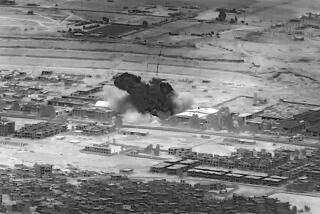U.S. begins scrutiny of Iraq security practices
- Share via
BAGHDAD — Members of a team dispatched by Secretary of State Condoleezza Rice have begun a review of the State Department’s security practices in Iraq after a shooting involving guards contracted by the U.S. Embassy, a spokeswoman said Monday.
The actions of private security companies have come under scrutiny since at least 11 Iraqis were killed in the Sept. 16 shooting involving guards from North Carolina-based Blackwater USA. The State Department probe is one of five ongoing investigations by U.S. and Iraqi officials.
A Baghdad court, meanwhile, has overturned the dismissal of the Basra provincial governor, adding fuel to a combustible struggle over political power in the southern oil hub.
The U.S. military early today announced the deaths of two soldiers. One was killed Sunday in combat in central Baghdad that also wounded 10 other Americans, two Iraqi soldiers, an interpreter and one Iraqi resident. Another U.S. soldier was killed and one injured in an accident in Qadisiya province the same day, the military said.
At least 3,807 U.S. military personnel have been killed since the start of the Iraq war, according to the independent website icasualties.org.
Deaths among U.S. forces have fallen recently; nearly 30,000 additional American troops were deployed to Iraq beginning in February. At least 66 U.S. service members were killed in September, down from a recent peak of 127 in May, according to icasualties.org. It was the lowest monthly death toll since August 2006, when 65 were killed, according to the site.
Ambassador Patrick Kennedy, the State Department’s director of management policy, and Ambassador Eric Boswell, a former assistant secretary of State for diplomatic security, arrived in Baghdad on Sunday and have begun meeting with U.S. and Iraqi officials, said U.S. Embassy spokeswoman Mirembe Nantongo. Other members of the team are expected to arrive soon.
Kennedy, who heads the panel, will present his preliminary findings to Rice by the end of the week, Nantongo said.
U.S. officials say private contractors play a crucial role protecting the embassy and its personnel, freeing up the military to fight insurgents and quell sectarian bloodshed. But resentment has built up here among Iraqis against the aggressive tactics employed by some members of the largely unregulated industry.
A preliminary inquiry by the Iraqi Interior Ministry concluded that Blackwater guards fired without provocation in the September incident while driving through a Baghdad square, but the company maintains that the convoy was ambushed.
In Basra, the gradual reduction of British forces in the overwhelmingly Shiite Muslim province has left rival political factions and their associated militias battling over the spoils. At stake is control of the region’s political posts, security forces and massive oil wealth.
Over the weekend, the Federal Court overturned a vote of no confidence passed by the Basra provincial council against Gov. Mohammed Waili, court spokesman Judge Abdul-Sattar Bayrakdar said Monday.
Prime Minister Nouri Maliki had ordered Waili to step aside after the April 28 vote, but the governor refused to leave office until his appeal had been heard. He questioned the legitimacy of some of the votes cast against him and argued that the ballot was not legal because it was not held at an official session.
Council members, speaking on condition of anonymity, said they could not hold the vote at the provincial council because of threats from militiamen loyal to the governor. They considered meeting at a police station but finally opted to sign a petition for his removal at the residence of the council chairman, they said.
The council is dominated by members of the Supreme Islamic Iraqi Council, one of the two largest Shiite factions in the national parliament. But the party split its vote for governor between two candidates, allowing Waili, from the smaller Al Fadila al Islamiya, or Islamic Virtue Party, to clinch the post.
The rivalry between Shiite factions has periodically flared into violence across the south.
In the Shiite holy city of Najaf, authorities announced strict security measures to protect pilgrims attending a major religious festival this week.
Hundreds of thousands of pilgrims are expected to converge on the Imam Ali shrine Wednesday to mark the anniversary of the death of a cousin of the prophet Muhammad who was in their eyes his legitimate successor. More than 30,000 Iraqi troops will provide security around the city, with air cover supplied by U.S.-led forces, Iraqi army Maj. Gen. Othman Ghanimi said. Pilgrims will be required to go through three layers of checkpoints before reaching a “safe zone” around the shrine.
In Monday’s worst violence, a suicide bomber detonated his explosives-laden car outside the gates of Mosul University, killing a professor and injuring five people, said the city’s deputy police chief, Brig. Gen. Muhammad Waga. The bomber had been targeting a passing police patrol but missed it by seconds, Waga said.
Police in Baghdad collected the bodies of 11 men shot execution-style, a hallmark of sectarian death squads.
U.S.-led forces killed seven suspected insurgents and detained 11 others in the last two days during raids targeting the Sunni Arab militant group Al Qaeda in Iraq, the military said.
--
Times staff writers Ned Parker and Saif Hameed in Baghdad, special correspondents Saad Fakhrildeen in Najaf and Ruaa al-Zarary in Mosul and a special correspondent in Basra contributed to this report.
More to Read
Sign up for Essential California
The most important California stories and recommendations in your inbox every morning.
You may occasionally receive promotional content from the Los Angeles Times.












